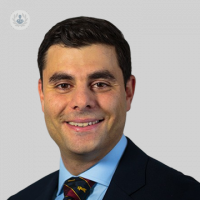Breaking down kidney stones: Top strategies for prevention and pain management
Written in association with:Kidney stones are a significant health concern due to their painful nature and the potential for recurrence. This condition can affect anyone, often resulting in severe discomfort that disrupts daily life. Understanding the factors that contribute to the formation of kidney stones and how to manage their pain is crucial for those at risk.
Mr Hamid Abboudi, renowned consultant urological surgeon, discusses the importance of awareness regarding kidney stones and the latest strategies for both prevention and effective pain management. He highlights the role of hydration, dietary adjustments, and lifestyle changes, as well as practical pain relief techniques, to help individuals reduce their risk of developing kidney stones and improve their overall quality of life.

What are kidney stones?
Kidney stones are hard deposits formed from minerals and salts that crystallise in the kidneys. They can vary in size and may cause severe pain when they pass through the urinary tract.
How can kidney stones be prevented?
Stay hydrated
Adequate hydration dilutes the substances in urine that lead to stone formation. Aim for at least 2-3 litres of water daily. Monitoring urine colour can help; light yellow indicates proper hydration.
Dietary adjustments
- Reduce sodium intake: high sodium levels can increase calcium in urine. Aim for a low-salt diet.
- Limit oxalate-rich foods: foods like spinach, nuts, and chocolate contain oxalates which can contribute to stone formation. Moderation is key.
- Increase calcium intake: adequate dietary calcium can help prevent stones. Opt for low-fat dairy products.
Maintain a healthy weight
Obesity can increase the risk of kidney stones. Weight management can help reduce this risk. Incorporate regular physical activity and balanced nutrition to achieve and maintain a healthy weight.
Limit sugary drinks
Sugary beverages, especially those high in fructose, can increase the risk of stone formation. Choose water or herbal teas instead of sugary drinks.
What are effective pain management strategies?
- Hydration: drinking plenty of fluids not only helps prevent stones but also aids in flushing them out, alleviating pain.
- Heat application: applying a heating pad to the affected area can relax muscles and reduce discomfort. Use a heating pad or warm compress for 20-30 minutes as needed.
- Physical activity: light exercise can help move the stones through the urinary tract and reduce pain. Activities like walking or stretching may be beneficial. Avoid high-intensity activities that may exacerbate pain.
- Positioning: finding a comfortable position, such as lying on the side or in a reclined position, can help alleviate discomfort during stone passage.
- Coping techniques: techniques such as deep breathing, meditation, or yoga can help manage the stress and pain associated with kidney stones.
When should you seek medical help?
If experiencing severe pain, blood in urine, or persistent symptoms, it is crucial to consult a healthcare professional. In some cases, medical intervention may be necessary to facilitate the removal of stones.
If you're interested in understanding more about effective strategies for preventing and managing kidney stones, consider scheduling a consultation with Mr Hamid Abboudi through his Top Doctors profile. This will allow you to discuss personalised approaches tailored to your specific needs.


